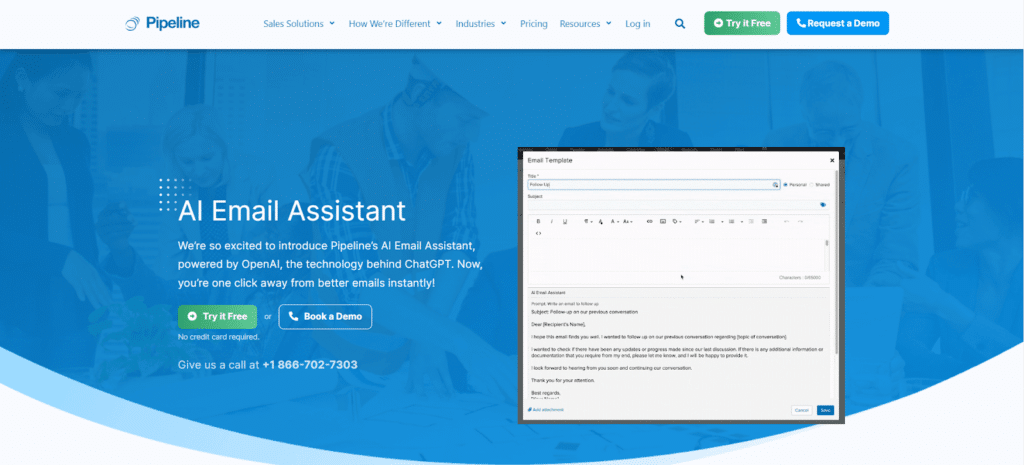The application of generative artificial intelligence (AI) is vast. Its practicality and automation can benefit almost every industry, including sales.
In most companies, sales is still an unstructured and highly variable process. As it involves a more people-driven approach, the integration of AI may seem unconventional. However, when implemented through a reliable sales pipeline CRM, it can reshape how your company interacts with customers, improving revenue.
From processing mountains of customer data to improving sales training, you can use generative AI in CRM to:
- Make your sales operation more efficient
- Segment customers and drive better personalization
- Prepare for risks and adjust strategies
- Close leads faster
- Improve customer experience
In short, generative AI in CRM can help your sales team assess, understand and connect with your target market.
Wondering how? Let’s dive into how your sales team can use generative AI and drive business growth.
What is Generative AI?
Generative AI is a variant of artificial intelligence that can learn from existing data sets and resources to produce new data. This includes images, videos, audio, code, text, and even simulations. A notable example of generative AI is OpenAI’s ChatGPT.
Compared to the more task-specific traditional AI models, generative AI offers more flexibility. It also doesn’t need any operation-specific programming to produce results, allowing almost everyone to leverage this advanced technology in their daily task, including in B2B sales work.
7 Ways Sales Teams Can Use Generative AI to Increase Sales
According to a McKinsey report, 50% of companies adopted AI in at least one business area, sales being one of the three fields with the most revenue effect from it. But how do these companies use generative AI in sales? Let’s find out.
1. Email Writing Tool for Sales with Generative AI
A study shows that salespeople spend 31 hours a month on emailing. That’s more than 4 full working days dedicated to emailing rather than selling.
To cut down on time, you can ask the generative AI tool to write the emails. However, this workflow is still not 100% efficient as you still need to switch between platforms (the AI and the sales CRM software).

To fully leverage the power of AI, why not use an AI email writing feature that is offered within your CRM software? Pipeline CRM, for instance, offers a built-in AI email writing assistant that allows you to write or rewrite emails with just one click. You can select the email purpose (e.g., book a call or say thank you), edit the emails (e.g., more engaging or rephrase it), and even change the text format directly from the Email editor system. See the examples of how to use Pipeline’s CRM AI email writing assistant here.
When you combine this with your customer data, you can easily create different email purposes tailored for each customer segmentation. Such efficiency lets your sales team create personalized outreach emails as soon as leads come into the pipeline.
Related: Download ready-to-use email templates for cold outreach, demo requests, and follow-up emails in this CRM guide.
2. Sales Forecasting with AI
One notable reason behind falling sales performance may be inaccuracies in sales forecasts. When forecasts are off the mark, it becomes difficult to gauge the true picture of market trends. This leaves your sales team flying blind, unable to effectively scale their operations to meet upcoming demand.
Sales pipeline CRM with generative AI capabilities can ease the process and make your sales forecasting more precise and automated. It can analyze customer responses and historical data and create predictive models.
Such an artificial intelligence-backed system captures real-time sales data and represents the accurate conditions of the market. You can uncover patterns, trends, and their correlations and recognize demand changes based on seasonality, customer preferences, and the bandwidth of your sales team.
3. Workflow Automation with Generative AI
Performing repetitive tasks like data entry or assessing previous customer interactions takes up significant time for sales teams.
Powered by generative AI, reliable custom CRM software offers sales automation, freeing up your team’s time to focus on tasks that drive conversion. These tools can sync your customer contacts in a single, easy-to-use dashboard, which is extremely helpful for companies scaling their customer base.
Your sales reps can use natural language prompts to enter the data into the AI tool to analyze the customer interactions and schedule follow-ups with the leads. Then, you can add the action points to your sales pipeline CRM. This will allow your sales reps to refer back to past interactions quickly and personalize sales calls better.
Additionally, you can also leverage the abundant information the generative AI has to generate new leads. For instance, your sales reps aim to target the Manhattan area to sell your cloud-based communication tool. To identify potential customers, they can ask the AI tool to find the top companies in the area.
4. Lead Scoring with Generative AI
Scoring your leads is important for efficient resource allocation. It measures the lead’s quality and ensures that your sales reps prioritize those most likely to convert.
But as your company grows, so will the number of leads in your pipeline, making manual lead qualification demanding. Plus, traditional lead-scoring methods depend on subjective data points and judgments. It can often lead to inconsistencies and missed business opportunities—and that’s where generative AI comes in.
A sales pipeline CRM platform integrated with artificial intelligence can assess large volumes of customer data quickly and accurately. It can identify the traits of your best users in granular detail and match your leads with your ideal buyer profile.
This way, your sales team will only focus on leads most likely to convert, enhancing operational productivity. Your lead-scoring system will improve continuously over time as the AI system learns each time it handles fresher data.
5. Sentiment Analysis
Understanding customer feedback is essential for any business to survive in the long run, as it helps drive continuous product and service improvements. Sentiment analysis can help companies uncover the most intricate details of each user’s feedback and align their services accordingly.
Generative AI can accelerate this process by analyzing every customer response in detail. It can detect particular patterns in user complaints and point out the most prevalent customer challenges. This can eliminate roadblocks in the customer journey, enhancing the customer experience.
Assessing the sentiment behind words in customer reviews also identifies customers at churn risk, giving you enough time to resolve the issue, re-engage, and retain them.
6. Sales Strategy Optimization
In rapidly evolving markets and changing customer needs, even your best strategies today may not drive the same results tomorrow. So, every business must monitor their sales performance and optimize the framework regularly.
Generative AI can provide real-time market updates on how customers respond to your product and sales techniques. You can automate surveys, run A/B tests, and let artificial intelligence determine which parts of your strategy don’t align with current customer needs. This allows you to make immediate modifications to better cater to customer preferences for higher sales performance.
7. Sales Training with Generative AI Tools
Applying generative AI lets you tailor coaching experiences for your teams and accommodate different learning styles. You can create sales call simulations for your reps to practice with, which will enhance their ability to adapt quickly to different customer needs and challenges.
Furthermore, generative AI can identify your sales reps’ strengths and weaknesses. Based on these insights, it can generate customized training modules focused on helping your reps become more well-rounded salespeople.
You can use artificial intelligence to create automated feedback loops, offering specific pointers on areas of improvement. It can also generate real-time sales performance metrics, enabling your teams to track progress and adjust their approach more effectively.
Not only that, but using generative AI for sales training is also much more cost effective than traditional training methods. There is no need to create individual training plans for every team. You can use virtual training environments and let your sales teams participate from different locations.
Adopt Generative AI-Powered Custom CRM Software To Boost Your B2B Sales Performance
Although sales is a people-approach action, artificial intelligence can still help in many ways. Here is a rundown on how generative AI can help your sales teams:
- Custom CRM software with generative AI can help you create personalized content for outreach emails without investing lots of hours.
- Automate tasks, predict customer behavior, create buyer personas, score leads, and forecast accurate sales.
- Dig deep into customer feedback and understand their sentiments.
- Analyze sales strategy and track its performance to create the most effective sales workflow.
- Enhance sales training sessions with AI-generated simulation, virtual training environments, and customized modules.
Seeing these immense benefits, Pipeline CRM integrated the power of generative AI, powered by OpenAI, to create a custom CRM software solution with a built-in AI email assistant. This innovative tool empowers your sales team to craft compelling emails in seconds, leading to faster closing times and freeing up your sales reps to focus on building relationships that matter.
Ready to strengthen your sales team with generative AI and hit and exceed your revenue goals? Choose your Pipeline plan today!



